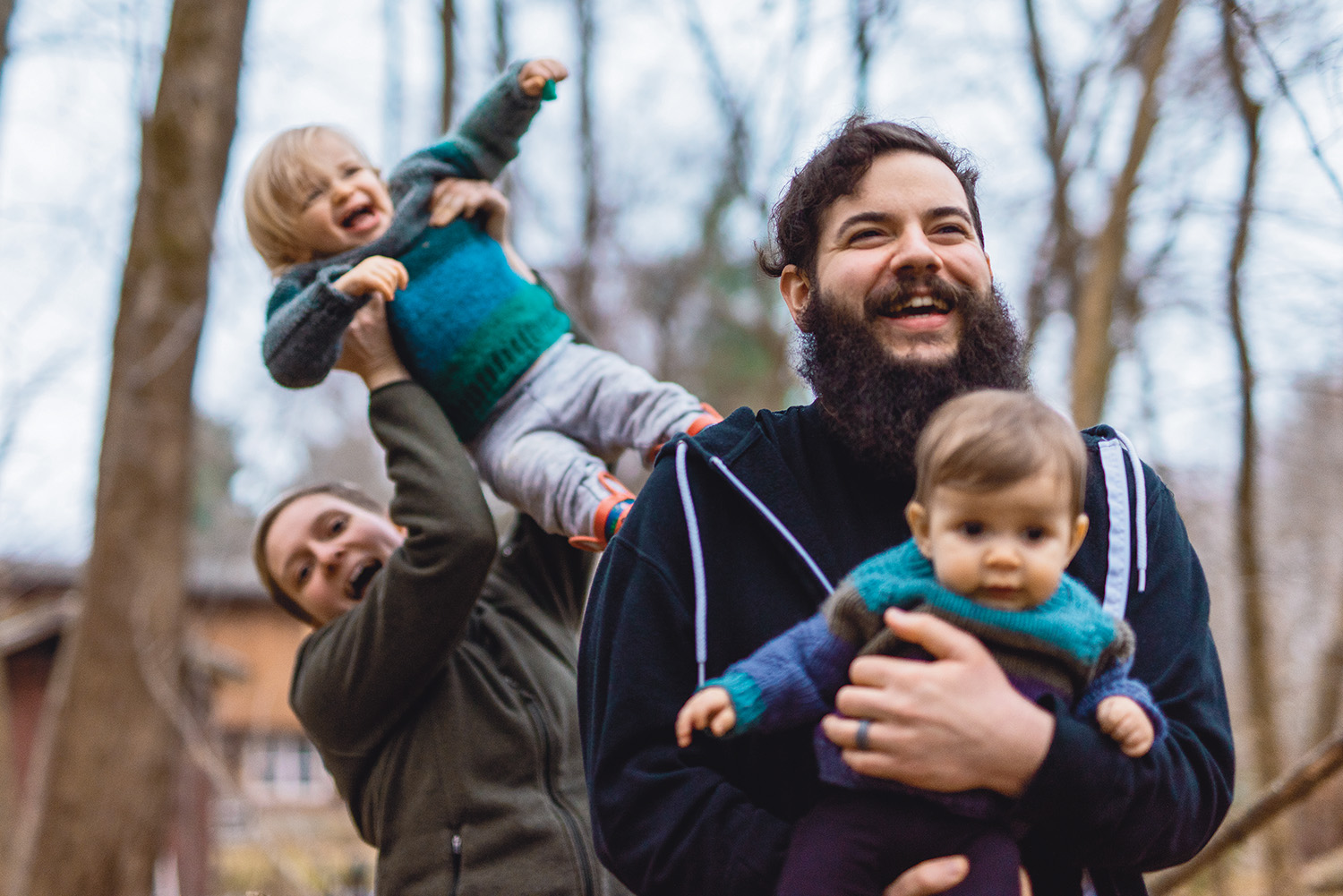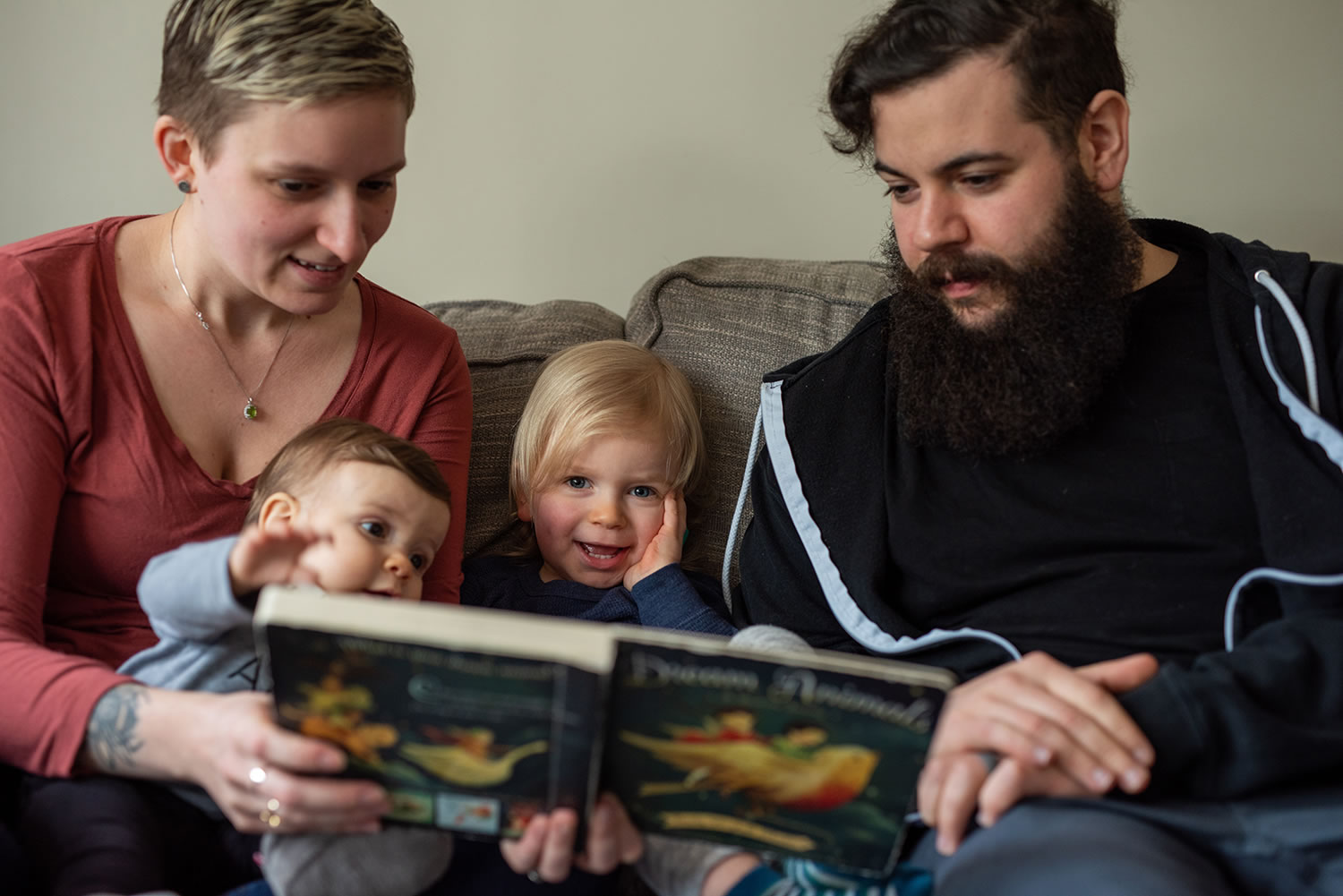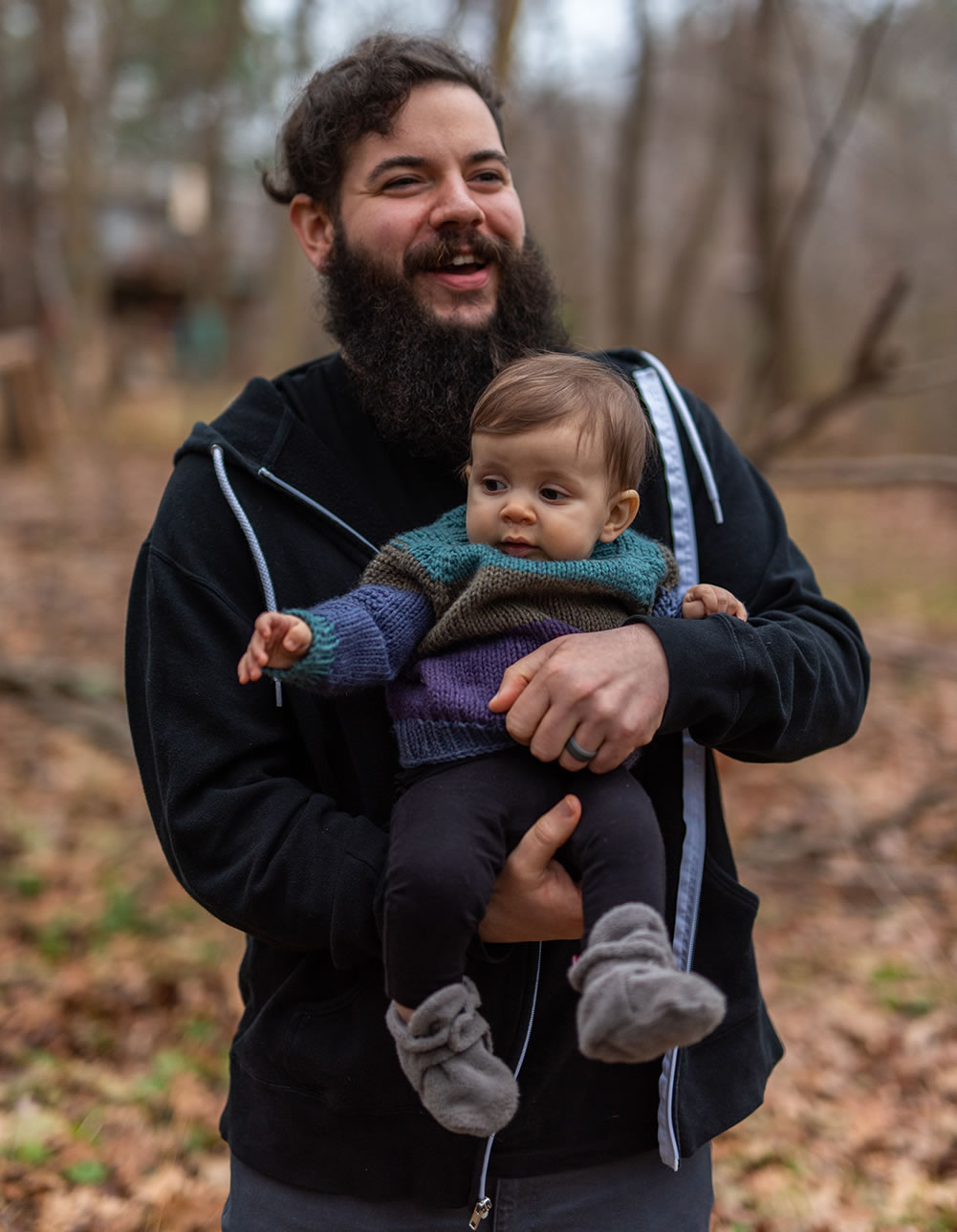Illuminating Unseen Dimensions
One Day at a Time
For Rich Razumny, life with ALS means making every moment count.

Thanksgiving preparations are underway in Rich and Leah Razumny’s home, which tomorrow will be filled with more than 30 family members and friends. Leah holds her infant daughter, Maeve, in her arms as she unpacks the fridge, pulling out onions, carrots, and celery to be cut, while Rich readies the cutting boards and knives. Arthur, their 2-year-old son, excitedly awaits instruction. Using a peeler, Rich demonstrates the basics of peeling a carrot. Trying to imitate his father, Arthur begins stripping the carrot skins into a bowl.
“There ya go buddy,” Rich says encouragingly.
Rich starts to slice the peeled carrots, carefully steadying the blade each time before exhibiting force. For Rich, most physical movements have become meticulous, deliberate acts. Even walking around the house requires a great deal of focus. Rich makes the effort each day with the clear goal of staying present in his children's lives — having the ability and time to play with them brings him the sincerest joy.
“That mat over there,” Rich points to Arthur and Maeve's play area, complete with toys and books. “I'm there all day if I can be.”
In February 2019, at the age of 28, Rich was diagnosed with amyotrophic lateral sclerosis (ALS), a fatal neurodegenerative disease that rapidly destroys motor neuron cells. Without a cure, Rich, now 29, struggles each day to maintain his physical abilities while he and his family must come to terms with the terminal prognosis. The transformation is truly a difficult one, but through his self-determination and familial support, he is continuing to see his intentions through.
Family first
Rich has always wanted to be a good father, and he has spent much of his life dedicated to making that a reality.
“I never wanted to be the best in my field professionally,” Rich says. “I never cared about that. I just wanted to have a house and a family and spend as much time with them as possible.” His career as a software engineer has helped support his dream and has continued throughout his difficult diagnosis, allowing him to work from home much of the time and provide a stable income.

Rich met Leah in his early 20s (she was finishing undergrad studies at the time), and the pieces of the puzzle started fitting together.
“It was clear to us that we wanted to be together for a long time,” Rich says.
Leah comes from a large family and Rich quickly felt very at home around them.
“When you join our tribe, you have to deal with a lot of people,” says Leah’s father, Artie. He met Rich early on. After winning Leah's heart, Rich continued to win over the rest of her family. He proposed to Leah during her college graduation party.
“During the party, I left with Leah's sister to buy the ring,” Rich says. “I told Leah I was out buying ice. I think she knew I was lying.”
While the party raged in the backyard, Rich met Leah in front of the house, got down on one knee, and made the formal proposal.
Their plan progressed quickly from there. Less than a year later, Rich and Leah secured a mortgage on a new house — one with a yard and ample space. Then, the two were married on a farm in Massachusetts surrounded by extended family and friends.
“The day after our honeymoon we adopted our dog, Maple,” remembers Leah. Their first-born, Arthur, came on the scene soon after, bringing joy to the entire family.
Two years ago, right after Arthur was born, Rich's physical condition started to decline in subtle ways. He hurt his hamstring cycling and went to months of physical therapy to heal. Then, he began having difficulties with his hand. He struggled to adjust the left side of Arthur's high-chair, and his hand cramped up while playing video games or guitar. At the gym, Rich noticed that his left arm could not complete a bench press, even without additional weight on the bar.
“My left arm would only get up to my ear,” he says. “It was like frozen. I wasn't weak. I had the strength, but it just wouldn't move.”
Rich started to walk with a limp, a phenomenon that bothered him and raised concern from friends.
“Then the fatigue started,” Leah says. “He was always a morning person — way more than I was — but it started to be the opposite.”
Frustrated with his body and struggling with activities that were important to him, Rich visited an orthopedist and another physical therapist. “The PT referred me to neurology.” Rich was taken aback. “I was like, 'OK, that's weird.'”
Scheduling with a neurologist was a task in itself; Rich waited two months for an appointment.
“When I visited the neurologist, he told me it was something neuromuscular for sure,” Rich says. The neurologist recommended an electromyography (EMG) test, but again, scheduling that could take months. Rich pushed for a quicker timeline.
“I told the doctor, 'Listen my wife is a nurse and is giving birth in two months. I need this test done sooner!'” Rich says. His appeal worked — the doctor stayed after hours to administer an EMG.
The EMG results were not good. Rich went to Massachusetts General Hospital (MGH) and scheduled another EMG within a week. However, the results from both EMGs, combined with the lengthy clinical observation of Rich's symptoms, led to one possible diagnosis: ALS.
“Normally [with ALS], a diagnosis takes months and months,” Rich says, “but because I had had symptoms for a long time, and waited so long to seek help, there was a clear, unmistakable progression.”

The diagnosis was shocking for Rich, Leah, and their extended family. In an instant, their plans vanished — their hopes and expectations became shrouded in doubt and overwhelming grief. But then, some joy: Leah brought new life into the world, giving birth to Maeve.
Day by day
Bringing Maeve home both reinvigorated family life and brought up difficult realizations that Rich was forced to face. Looking at his newborn daughter, Rich was overcome with the possibility of missing out on her life.
“We wanted to have kids when we were younger so we would have more time with them,” Rich says. “I thought that we had so much time.”
ALS progresses at different rates for different people, with 50% living at least three years after diagnosis, 20% living at least five, and 10% living at least 10.[1] Rich’s ALS has progressed slowly thus far, for which he is grateful, but the uncertain timeline has often fed his anxieties about the future.
“The biggest thing that I kept running into, that would bring me really down, was thinking too far ahead,” Rich says. “All I could think about was how everything was going to go wrong. How everything was going to change.”
Rich saw the inevitable: the automatic wheelchair, eating through a G-tube, losing his voice, a tracheostomy, the compressions of a respirator. “I wasn't taking it one day at a time,” he says. “I needed to bring my scope in about what I was allowing myself to think about. Little by little, each day, I kept going, and thought about how to make the most of one day. If I didn't make the most of that one day, it was all right. I'd try again the next day.”
Rich and Leah have harnessed this attitude together, focusing on spending quality time with family. Remaining proactive, Rich is heavily focused on maintaining his physical and mental health. He has made significant changes to his diet, eliminating gluten and other inflammatory foods, and he began taking Radicava, one of two FDA-approved medications used to slow the progression of ALS. He also started seeing a therapist to alleviate his anxiety and depression. His family received support from Parenting at a Challenging Time (PACT), a program at MGH that still provides them with crucial guidance on how to talk to their children about terminal illness, and Rich and Leah attended an MDA Engage Disease Symposium on ALS, which offered them their first chance to meet other families impacted by ALS.
And so for the time being, Rich does his best to cultivate joy and take advantage of all the time he has to support and spend time with his family. After wrapping up Thanksgiving preparations, Rich, Leah, and the kids head out to the ambling brook that flows behind their house to catch the last rays of the afternoon sun. Leah continues to cradle Maeve, while Arthur runs wildly, picking up sticks and rocks and tossing them into the stream. Rich never rushes to catch up but remains content on carefully placing each step on the uneven ground covered in slick fallen leaves.
“This is good for me,” he says. “It helps me practice my balance.”
Continuing to challenge himself will be critical for the next phase of his life, as his abilities change.
“I am still pretty independent,” he says. “I have to walk slower than other people. I can't run anymore. I can't do stairs too well. But there are a lot of things I can do. And ultimately, that is what helps build me back up. The things I can do.”
References
1. From the ALS Association, alsa.org